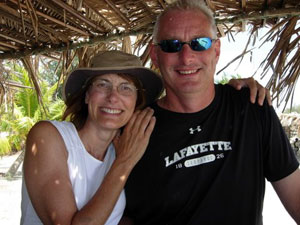Dan ’82, wife Kay ’82, and sister Diane ’78 bring necessities and education to an isolated town
 When Dan Ramus ’82 graduated, Sen. Bill Bradley addressed his class, talking about the progress made in American education in the students’ lifetimes, moving from pencils to computers.
When Dan Ramus ’82 graduated, Sen. Bill Bradley addressed his class, talking about the progress made in American education in the students’ lifetimes, moving from pencils to computers.
Years after Ramus left Lafayette, he saw firsthand how important a simple pencil can be. For the past seven years, he and members of his family, including wife Kay Reynolds Ramus ’82 and sister Diane ’78, have volunteered their time for A Friendly Hand, a Maine-based group that Dan helped establish to work in Concepcion del Norte, a town deep in the mountains of Honduras.
Early in his philanthropic education, he learned the value of the simplest items.
“One of the greatest products in the world is a five-gallon bucket,” Ramus says. “It’s a safe and strong and protective container. It comes with rubber seals. You can put perishable goods in them and soft goods. They stack beautifully and can be handled easily by human hands. A bucket can hold 30 pounds, and you put one in each hand and head off wherever you’re going. And when you’re done hauling things, it can be a washing machine, a toilet, or you can gather your water in it. Forever. You can’t destroy these things.”
You might say the metallurgical engineering graduate is working to engineer a better life for the people of Concepcion del Norte. He has learned that a bucket can hold 60 lunches for shipment between Maine and Honduras, 30 pounds of rice, or 1,700 pencils. A typical shipping container can hold 2,200 hundred buckets; it costs $5,000 per container to ship from Maine to Honduras.
“We donate 20,000 to 30,000 pencils a year,” Ramus says. “Our kids throw them out, but this is the number one need expressed by principals and teachers throughout Honduras. Seventeen hundred pencils may last a year in a school. And they still have the bucket when they’re done.”
Ramus has also learned the meaning of “dirt road economy” in Concepcion del Norte.
“Commerce doesn’t travel down the road until you pave it,” he explains. “Nothing goes to these towns. And of course there’s no factory at the other end of that dirt road. They are isolated by being at the end of a 23-mile dirt road.”
That fit well with what Ramus and his group of volunteers were looking for. They were hoping to find a community they could help while providing others a way to study the effects of poverty in isolation in order to discover new and effective ways of alleviating such conditions.
“We were hunting for a community where we could tackle the disgrace of poverty in a Petri dish,” he says, “where we can come in and help with food, water, medicine, education, and self worth — the five fingers of a friendly hand.”
While larger organizations have offered to help scale up the project, Ramus has declined assistance that doesn’t fit with the model A Friendly Hand has developed. Money breeds corruption, he explains. “The problems of Concepcion del Norte don’t require money,” he says. “Even small groups can tackle them.”
The partnerships A Friendly Hand enters into involve those looking to use the facilities his group has established in the isolated town.
“If you’re studying HIV or the effectiveness of nets to reduce malaria or child nutrition, we have a controlled community,” Ramus says. A Friendly Hand built a community center and a clinic to handle the food and other materials that come in; the community runs and operates the facilities.
Ramus has kept involved with Lafayette, helping to run his class’s 25th reunion back in 2007, which featured “The Educated Philanthropist,” a talk he organized with the Landis Community Outreach Center. A few years ago at a conference in Honduras, he met two members of Lafayette’s Engineers Without Borders student chapter, who gave a talk about their efforts to help a Honduran community access drinking water. Indeed, the lessons he learned in college are never far from his mind.
“As Lafayette grads, we’re probably among the top 1 or 2 percent of the world in terms of education,” he says. “With a good education behind us, we can use our brains to help solve international problems. I credit that training with whatever successes I’ve had in the philanthropic world.”
 When Dan Ramus ’82 graduated, Sen. Bill Bradley addressed his class, talking about the progress made in American education in the students’ lifetimes, moving from pencils to computers.
When Dan Ramus ’82 graduated, Sen. Bill Bradley addressed his class, talking about the progress made in American education in the students’ lifetimes, moving from pencils to computers.